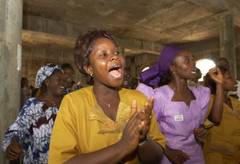Living Letters teams to witness reconciliation work of churches in Liberia, Sierra Leone and South Africa

Regent Road Baptist Church in Freetown was severely damaged during the civil war. During reconstruction, worships were held in the basement of the church. Photo: Peter Williams/WCC, 2001
In Liberia, Sierra Leone and South Africa, churches have played a major role in reconciliation between groups who had been in violent conflict with each other for decades. Two international ecumenical teams sent by the World Council of Churches (WCC) will visit the three countries during the next two weeks.
The church representatives (see lists below) from different African countries, North America, Asia, the Caribbean and the Middle East are being sent as "living letters" to express the solidarity of the WCC fellowship, which comprises 349 churches worldwide. Until 2010, several Living Letters visits take place each year throughout the world in the context of the WCC's Decade to Overcome Violence in order to prepare for the International Ecumenical Peace Convocation in 2011.
Liberia and Sierra Leone, 2-8 November
Both Liberia and Sierra Leone were devastated by civil war in the 1990s. Liberia returned to peace and stability after the president and former warlord Charles Taylor was ousted in 2003 and Ellen Johnson-Sirleaf was elected head of state in late 2005. In neighbouring Sierra Leone, civil war officially ended in 2002.
As the WCC closely followed Sierra Leone and Liberia during the years of civil conflict, it learned first hand about the suffering of the people. After the cessation of the violence, the WCC supported the churches and other ecumenical partners in providing relief and rehabilitation.
The Living Letters visit to the two West African countries will focus on learning how these nations cope with the memories of war. The ecumenical delegation will learn about the initiatives for peace in which the National Councils of Churches of both countries have engaged in coordination with other faith communities, especially Sierra Leone's Muslim majority.
Meetings with the president of Sierra Leone, Ernest Bai Koroma, as well as other government representatives figure on the visit's agenda. So do encounters with people engaged in peace work on the ground, for example at a facility in Kenema in the eastern part of the country, where children who had lived in the streets after the war are now supported by the Council of Churches in Sierra Leone.
Members of the ecumenical delegation:
- Bishop Dr Robert Aboagye-Mensah (delegation leader), presiding bishop of the Methodist Church in Ghana
- Rev. Dr Angélique Walker-Smith, National Baptist Convention, USA
- Ms Anam Gill, Presbyterian Church in Pakistan
- Mr James Macharia, Presbyterian Church of East Africa, Kenya
Dr Aruna Gnanadason, WCC executive director for Planning and Integration, will join the delegation in Sierra Leone.
South Africa, 5-12 November
The Living Letters visit to South Africa is significant because of the role the country's churches and their national council have played in overcoming the violence of the apartheid ideology and system. Since the first free and democratic elections in 1994, the churches have continued to work for peace, justice and reconciliation.
It was South Africa that inspired the WCC programme which gave birth to the Decade to Overcome Violence. The names of the places in the provinces of Gauteng (Soweto, Alexandra Township) and Kwazulu Natal (Durban and Pretoria) which the Living Letters team will visit bring to mind this historic struggle for a just and peaceful society.
The ecumenical visitors will meet with church leaders and communities working on justice and peace, such as the organization "Love in Action" in Mabopane, Pretoria - a centre that reaches out to people "discarded" by society, and provides education to street kids and prisoners.
Members of the ecumenical delegation:
- Canon Dr John Gibaut (delegation leader), director of the WCC's Commission on Faith and Order
- Rev. Suzanne Matale, African Methodist Episcopal Church, Zambia
- Rev. Carol Hancock, United Church of Canada
- Rev. Norbert Stephens, United Church in Jamaica and the Cayman Islands
- Mr Andraous Jahsan, Greek Orthodox Church, Palestine
- Rev. Michael Wallace, general secretary of the World Student Christian Federation
The visits are hosted and organized by the Liberian Council of Churches, the Council of Churches in Sierra Leone and the South African Council of Churches.
More information on Living Letters visits to churches
WCC member churches in Liberia
WCC member churches in Sierra Leone
WCC member churches in South Africa



